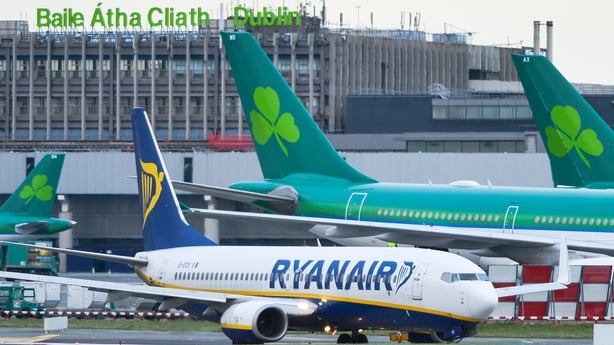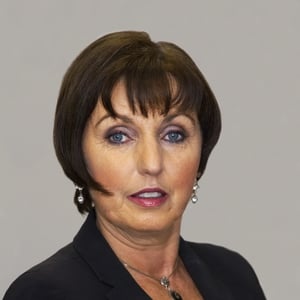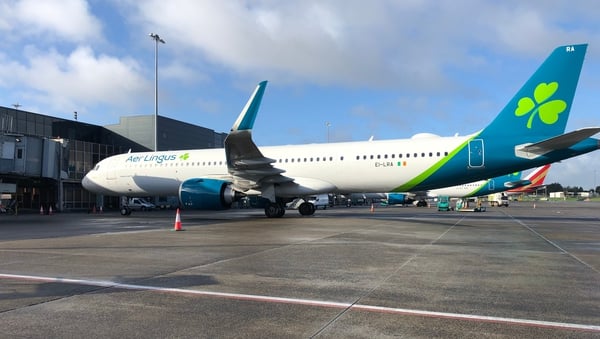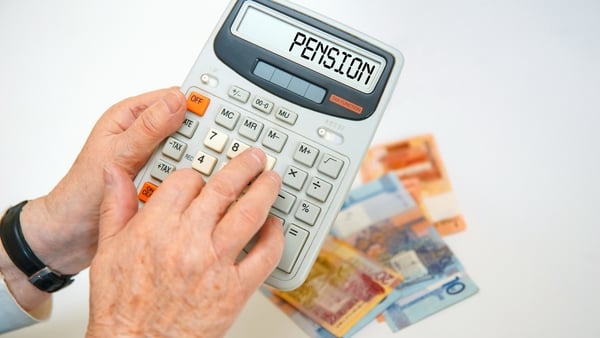The Government is considering an extended wage support scheme specifically for aviation amid fears of further job losses in the sector, according to a senior official in the Department of Transport.
Assistant Secretary Fintan Towey made his comments addressing the Fórsa Services and Enterprises conference this morning.
Mr Towey also said that there was a recognition across Government of the need to provide clarity on any lifting of travel restrictions before the end of May.
A possible announcement in relation to this is expected "in the coming week or two", he said.
Mr Towey told delegates it was now evident that recovery in the aviation sector was going to lag behind the rest of the economy and that this would necessitate "some adjustment in employment levels".
He acknowledged there had been hardship and a loss of employment in aviation.
But he said State supports including the Pandemic Unemployment Payment, the Employment Wage Subsidy Scheme, rates waivers, deferrals of tax and grants for small businesses had played a role in limiting that hardship.
He reiterated the Government commitment that there would be no "cliff edge" for supports - but acknowledged that specifics have yet to emerge regarding what will happen after the end of June.
Mr Towey noted that supports for the aviation sector last year came to €200m, with a further €80m sector-specific package announced last December.
However, he said the Government was open to considering the possible requirement for "further sector specific supports" if that proved necessary to bolster the recovery of the industry.
He confirmed that an aviation sub-group of the Labour Employer Economic Forum was examining a proposal for a special extended Employment Wage Subsidy Scheme for the sector.

Mr Towey said he expected that following consideration at Government over the coming weeks, there would be progress on a roadmap to restart aviation that would give some assurance to the wider public about the possibility of travel over the summer.
He said it was a positive that when the pandemic struck, companies like the Daa, Aer Lingus, Ryanair and the Irish Aviation Authority had all been in a strong position relative to their peers.
"That has meant that those companies and in particular the airlines did not need urgent government bailouts that were required for other airlines", he told Fórsa delegates.
He said all those companies were working their way through their cash, but had taken action to bolster their financial position, including raising capital from shareholders, issuing bonds, or raising loans in other ways.
He noted that both Aer Lingus and the Daa had received funding from the Irish Strategic Investment Fund, which would help to bolster them for survival.
He also highlighted ongoing work at EU level to develop a regulation to establish a Digital Green Certificate on vaccination.
'Cliff edge' fears very real for aviation workers
Responding to Mr Towey's speech, Fórsa National Secretary Ashley Connolly called for a "bespoke" aviation income support scheme to underpin employment, and maintain the relationship between employers and employees "over what is likely to be a significant period of recovery."
She said that for the last 15 months since the pandemic struck, aviation workers and their families had been under massive strain, with unacceptable levels of uncertainty, fear and anxiety about the future.
Ms Connolly said they continued to face the prospect of prolonged reductions in pay and working hours, increased risk of temporary layoffs, and an uncertain future while struggling to pay rent, mortgages and other bills.

The Fórsa official also noted that while another summer of uncertainty loomed, aviation workers had an additional worry as to whether they will continue to receive the essential income via payroll supports that have underpinned thousands of jobs in sectors like hospitality and tourism that rely on international travel.
"We've been told there will be "no cliff edge" but thousands of cabin crew, pilots and airport staff are at the cliff edge - wondering if they will be in jobs or able to pay the mortgage, not next year, but a few short weeks away," she told delegates.
"Frankly, the cliff edge looks a lot closer when you and your family are standing on it, with the uncertainty increasing your stress and anxiety with every sleepless night," she added.
Ms Connolly said three major reports on aviation had been published in less than a year, but were "sitting on shelves and gathering dust."
She said it was time to act on their recommendations as a matter of urgency, noting that only last week, multiple airlines had reaffirmed their continued practice of layoffs, with the threat of "irreversible" decision in the absence of clarity from the state.
The union official urged the Department of Transport to provide the necessary income support to protect the jobs of highly skilled workers, and to deliver clear guidance on when and how international travel will be allowed to resume.
She also demanded a clear message that Ireland is open to key markets, a commitment that Ireland will adopt the European Commission Green Digital Certificate, the reopening of the common travel area with the UK and a clear travel corridor with the US.
Fórsa General Secretary Kevin Callinan slated the Government's response to the aviation crisis as "tardy", "timid" and substituting "mere activity" for real action.
He warned that unless some urgency was injected into the state response, there was a real danger that recovery would be incomplete.
"That's not acceptable to us and it should not be acceptable to any politician or organisation that cares about the welfare of aviation workers, the success of the Irish economy, or the prosperity and life-quality of our society and communities," he told delegates.
He reiterated that aviation companies which imposed compulsory redundancies or off-shored operations and work should not benefit from state aid funded by Irish taxpayers.






